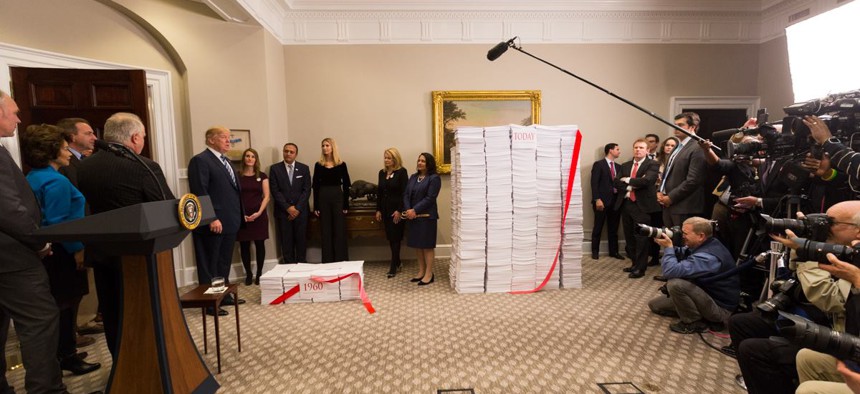
President Trump prepares to cut the “red tape” of regulations at a White House event in December 2017. Official White House Photo by Shealah Craighead
Federal Judge Dismisses Lawsuit Challenging Trump’s Deregulation Plan
Plaintiffs challenged an executive order requiring agencies to eliminate two regulations for every new one they introduce.
After an almost three year legal battle, a federal judge in late December dismissed a lawsuit challenging an executive order President Trump issued shortly after his inauguration that requires agencies to cut two regulations for every new one issued.
The order is a cornerstone of the administration’s deregulatory agenda. In February 2017, two nonprofit groups, Public Citizen and the Natural Resources Defense Council, along with the Communications Workers of America ALF-CIO, filed a lawsuit against the administration arguing that the order “exceeds President Trump’s constitutional authority, violates his duty under the Take Care Clause of the Constitution, and directs federal agencies to engage in unlawful actions that will harm countless Americans, including plaintiffs’ members.” They argued the implementation and enforcement of the order should be blocked.
On Dec. 20, Judge Randolph Moss of the U.S. District Court for the District of Columbia ruled the plaintiffs lacked standing in their case and could not prove the executive order caused the delay of two rules they want implemented—one regulation would have established a federal safety standard for vehicle-to-vehicle communications to avoid crashes and another would have set energy-efficiency standards for commercial water heaters. “The judge had already dismissed their claims once before, but gave them another shot by allowing them to submit additional evidence about the rules in question,” Law360 reported. With the new evidence, the plaintiffs, “told the judge that their members have been harmed by the delays, giving the groups standing to continue the lawsuit.”
Moss wrote in his decision that the executive order could have “delayed or derailed at least some regulatory actions that, if adopted, would materially benefit Plaintiffs or some of their members.” However, “for several reasons, it is hard to say with the requisite degree of confidence which actions those are, what would have occurred in the absence of the executive order, how any identifiable individual (or entity) is harmed, and whether any such harm—or risk of harm—is sufficient to establish standing.”
Among the reasons the judge noted were: the Office of Management and Budget’s lack of public communication on regulation actions, the lack of public records on agency decisions, and the administration's overall “general awareness of federal regulation.”
The plaintiffs have not yet decided if they will appeal the decision, Public Citizen told Government Executive.







